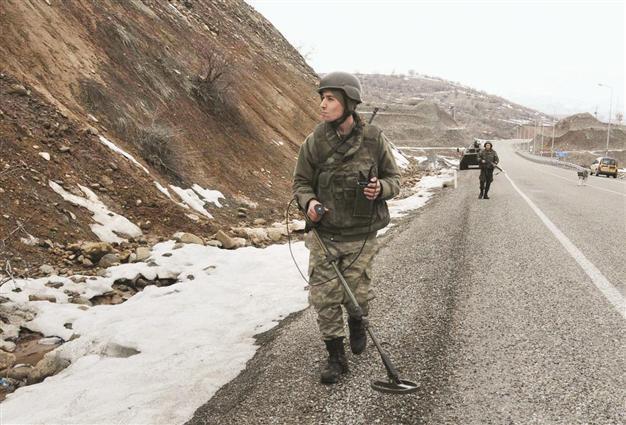BDP calls for Parliament inspection into landmines
ANKARA

A Turkish soldier is seen inspecting mines or roadside bombs during an action in southeastern Turkey. DHA photo
The Peace and Democracy Party (BDP) has introduced a proposal to launch a parliamentary inquiry for detecting and clearing landmines and for the recognition of the legal rights of those who have suffered damages due to mine explosions.
Land mines laid in the east and southeast of Anatolia due to security policies and unexploded military material pose a serious problem, the proposal introduced to the Parliament Speaker’s Office on April 26 by BDP deputy parliamentary group chair İdris Baluken said.
Recalling that, so far, there have been partial efforts to clear landmines only near the Syrian borders, with no move at all near the borders with Iraq and Iran as well as rural areas which are not close to the borders, the BDP said in last decade 20 people died and 67 people were injured because of mine explosions.
Turkey’s plans to clear a vast belt of landmines have been clouded by Syria’s civil war. Starting in the 1950s, Turkish forces planted more than 600,000 U.S.-made “toe poppers” – mines designed to maim, not kill – and other land mines along much of its border with Syria, which runs from the Mediterranean Sea to Iraq. The aim was to stop smugglers whose black market goods undercut the economy and later to thwart attempts by militants of the outlawed Kurdistan Workers’ Party (PKK) to infiltrate Turkey’s southeast. However, the mines also killed and maimed civilians, took arable land from Turkish farmers and are now considered by many as a crude method of policing.
European supportTurkey says it plans to clear mines on the Syria border by 2016, missing a March 2014 deadline set by the international Mine Ban Treaty. The International Campaign to Ban Landmines, a Geneva-based group that won the 1997 Nobel Peace Prize, has criticized Turkey for its slow progress. The European Union has committed 40 million euros to demining and surveillance equipment near Turkey’s borders with Iran and Armenia, as Turkey could eventually become the EU’s most eastern border.
